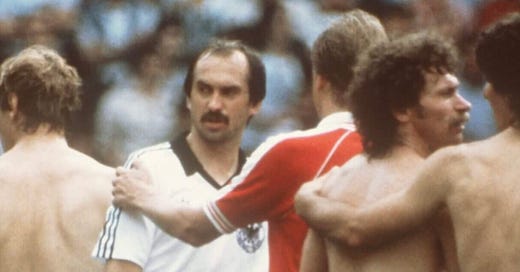In the summer of 1982, the Spanish coastal city of Gijón played host to a match that has since gone down in World Cup folklore. West Germany and Austria, locked in a tight group alongside debutants Algeria and Chile, played out a 1-0 result that benefitted both.
The opening ten minutes saw a goal, but the remaining eighty were a tiresome affair that ever-so-slowly crept towards a win-win finish for these two sides. No ambition to attack, but worst of all, no shame.
The 22 players on the pitch appeared to be on the same page. But the reaction was far from united. In Austria, the national press were outraged, while the West German media took a more pragmatic stance.
Algeria, who had already stunned the Germans with a 2-1 smash and grab, and fought past Chile, believed they had done enough to progress. But the group’s final fixture took place after Algeria vs Chile, giving their European counterparts the opportunity to calculate precisely what outcome would be mutually beneficial.
Inside Sporting Gijón’s El Molinón, locals waved white handkerchiefs - a traditional way to show disapproval, and sometimes mock surrender. A few Spaniards reportedly threw change onto the pitch, accusing players of accepting bribes. But the outrage wasn’t limited to neutral fans expecting entertainment.
In West Germany, the response was mixed - split between pragmatism and unease. Popular football publication Bild labelled the match “eine schande” (a disgrace) while pointing out the undeniable logic. Kicker magazine’s analysis reminded readers that teams are in tournaments to advance, not entertain, but even they couldn’t hide a hint of discomfort.
Eberhard Stanjek, a German public service commentator, protested with silence. After Horst Hrubesch’s opening goal, his commentary mirrored the action (or lack of it) on the pitch. At one point, he pondered “What are we to say about this? Nothing, I suppose.”
Among West German fans, the reaction wasn’t fury so much as awkward resignation. Letters to newspapers in the days that followed included words like “peinlich” (embarrassing) and “unwürdig” (unworthy). Some begrudgingly accepted the incident as necessary, while others saw it as poor sportsmanship.
In Austria, the backlash was more fierce. The national broadcaster’s commentator, Robert Seeger, didn’t mince words when he told viewers: “We are sorry you had to witness this. Don’t bother watching any more.” Some papers referred to the game as “the most shameful hour in our football history.” A tabloid headline the following morning read: “Wir schämen uns” (We are ashamed).
There was also a sharp edge of sarcasm to the Austrian coverage. A cartoon published in Die Presse showed a player reclining in a deck chair, cocktail in hand, captioned: “Matchday in Gijón.” Another editorial dubbed the game the “Gijóner Friedenspakt” (Gijón Peace Pact), a dark reference to the non-aggression treaty signed by Nazi Germany and the Soviet Union prior to the Second World War.
Among Austrian fans, many felt a mix of second-hand embarrassment and frustration - not just with the spectacle itself, but with the implication that Austria had simply gone along with German strategy. Some players later admitted the event was unfortunate, though none confessed to any form of organised collusion.
It would be easy to imagine a shared guilt might unite the two footballing nations. But the Disgrace of Gijón seemed to highlight a cultural difference instead. In West Germany, the event was largely rationalised as a necessary evil. In Austria, it was condemned. Maybe this was a matter of power dynamics - Austria, the younger brother, feeling its integrity was thrown away for the convenience of its opponent. Or perhaps the Austrians just had less appetite for a hollow success.
The match did lead to one important reform on FIFA’s part. From 1986 onwards, all final group games at World Cups have been played simultaneously - an attempt to prevent the Disgrace of Gijón from repeating itself. This has largely been a success, with some exhilarating conclusions to group stages in recent decades.
But it all comes back to what teams and fans value more in football - winning, or winning the right way? Can national teams ever entirely prioritise entertaining football over the pressure to progress? In Gijón, two teams took the safest route to the knockout stage, but to many fans, it felt like defeat.





